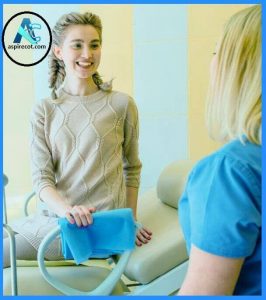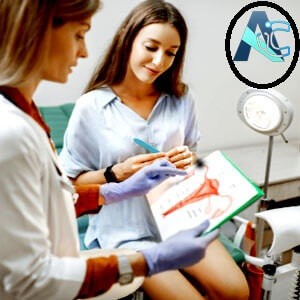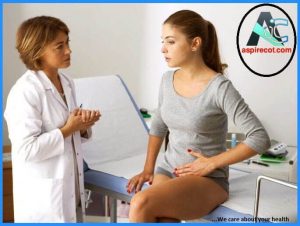adolescence period! All you need to know and when to visit a gynecologist?

When it is time for my daughter’s first consult with a gynecologist?
People are becoming aware of the health of women’s reproduction day by day. The period of adolescence is very important for a girl. The age between 10 to 24 is the phase when girls and boys grow up from childhood to adulthood. In the phase of adolescence, they go through many physical and mental changes. So parents need to be aware of their daughter’s health.
Time to consult with a gynecologist
It’s better to consult with a gynecologist when your daughter’s age is between 13 to 15. In the first two years of menstruation, it’s normal that the period doesn’t follow the cycle properly. But when it is excessive menstrual pain then you need to consult with a gynecologist. In the first consultation, the vaginal experiment is unnecessary. If parents are not free with their daughter to discuss the menstrual cycle, go for the consultation. The first consultation is important. They will be able to know the appropriate information about menstruation. If your daughter is sexually active then it’s necessary to consult with a gynecologist. However, shaving or waxing around the vagina before the consultation but maintaining proper hygiene is important.

Period? no to feat
General Knowledge about Menstruation
The first period of a girl begins between the ages of 12 and 15. The first period is also known as menarche. However, menstruation can start as early as 8 years old or as late as 16 years old. During periods bleeding lasts 3 to 7 days. In young women, the duration between the first day of one period and the first day of the next is typically 21 to 45 days. The average duration in adults is 28 days, with a range of 21 to 31 days. Moreover, periods stop during pregnancy and after childbirth.
Menstrual cycle: The monthly process of changes that a woman’s body goes through in preparation for the potential of pregnancy is known as the menstrual cycle. There are 4 phases of the menstrual cycle.
Menstruation: it means the elimination of the thickened lining of the uterus from the body through the vagina.
The follicular phase: In this phase, the pituitary gland releases follicle-stimulating hormone (FSH). This hormone stimulates the ovary to produce around five to 20 follicles. Each follicle turns into an egg. This can occur around day 10 of a 28-day cycle.
Ovulation: In this phase, a mature egg is released from the surface of the ovary. After it’s released, the egg moves down the fallopian tube and stays there for 12 to 24 hours, where it can be fertilized. This usually occurs mid-cycle, around two weeks or so before menstruation starts. The ovulation phase occurs 12 to 14 days before your next period starts. This is the time when one has the highest chance to get pregnant.

Girls’ first visit to a doctor
The luteal Phase: When a fertilized egg implants in the uterine lining, it produces the hormones needed to keep the corpus luteum healthy. This includes the hormone human chorionic gonadotrophin (HCG), which can be identified in a pregnancy urine test. Moreover, The corpus luteum withers and dies if pregnancy does not occur, usually around day 22 of a 28-day cycle.
Misconception about period
Periods blood is dirty blood: Periodic blood isn’t rejected body fluids or the body’s way of flushing out toxins. Periods contain blood, uterine tissue, mucus lining, and bacteria.
Don’t eat fish: Some parents don’t let their daughters eat fish. There is no relation between fish and periods. Rather nutritious food is necessary during periods.
Not to go outside: Mothers don’t allow their daughters to go outside during their first periods. The period is a normal and natural process. One can maintain a regular routine during periods too.
Avoid physical activities during period: Some girls pause their exercise during periods. Physical activities can ease cramps, back pain, and headache. But it’s not recommended to lift heavyweights.
Home Remedies for menstrual cramps
Applying heat to the abdomen can give relief from cramps. Moreover, massaging with oil is also helpful to reduce pain. Some scientific research found that orgasm on cramps also may be helpful to reduce pain. However, chamomile tea, cinnamon, ginger, and fennel seeds are beneficial. Besides, dill and French maritime pine bark extract are also helpful during periods. All the elements can give relief to menstrual cramps.

consulting gynecologist
Menstrual disorders
Premenstrual Syndrome (PMS): Physical and psychological problems that occur before menstruation are referred to as a premenstrual syndrome. During their menstrual cycle, women with PMS are hypersensitive to their own normal cyclic hormones (progesterone and estrogen).
Dysmenorrhea: Dysmenorrhea is severe, frequent cramping during menstruation.
Menorrhagia: It refers to heavy bleeding. It includes prolonged menstrual periods or excessive bleeding during a normal-length period. It can cause anemia if the disorder is ignored.
Metrorrhagia: Metrorrhagia is bleeding at irregular intervals, particularly between expected menstrual periods.
Amenorrhea: Amenorrhea is the absence of menstruation. Except during pre-puberty, pregnancy, lactation, and postmenopause, this is regarded abnormal. Low or high body weight, as well as extreme exercise, are possible causes.
Solution for menstrual disorders
Firstly, nonsteroidal anti-inflammatory drugs can give relieve menstrual cramps. Secondly, turmeric-containing curcumin works for Premenstrual Syndrom(PMS). Additionally, curcumin is an anti-inflammatory element that can relieve pain. Thirdly, oral contraceptives regulate the periods. Moreover, it reduces heavy bleeding. Fourthly, tranexamic acid (Lysteda) helps to reduce menstrual blood loss and it is recommended at the time of the bleeding. Fifthly, oral progesterone is a hormone that can help regulate hormones and lessen menorrhagia. Finally, Hormonal IUD (Liletta, Mirena) releases levonorgestrel, a form of progestin that thins the uterine lining and reduces menstrual blood flow and cramps.

consulting gynecologist
Maintaining hygiene during period
It’s recommended not to wear a pad for more than 7 / 8 hours. In terms of tampons, one should not use them for more than 4 hours. In addition, using a tampon increases the risk of Toxic Shock Syndrome(TSS). During periods, rinsing the genital area twice a day is recommended. One should not use regular soap in the vagina. Using warm water is enough as the vagina is a self-cleaning organ. One should not point water directly at the vagina. Moreover, tracking your periods is important.
It’s not a medical service. Please consult a doctor before taking any medicines.
If you have any questions regarding our topic then please feel free to comment below.
Thanks for being with us.
Writer: Ummul Mum Tahana
BRAC University
Computer Science and Engineering
Edited By: AL-Resalat
BA & MA
English Language and Literature













